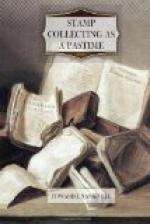Not a few countries are every year rescued from absolute bankruptcy by the generosity with which collectors buy up their postal issues; and many other countries would have to levy a very much heavier burden of taxation from their peoples if stamp collecting were to go out of fashion.
So widespread indeed is our hobby that a well-known collector might travel round the world and rely upon a cordial welcome at the hands of fellow-collectors at every stopping-place en route.
International jealousies are forgotten, and even the barriers of race, and creed, and politics, in the pleasant freemasonry of philatelic friendships.
[Illustration:]
[Illustration:]
V.
Its Geographical Interest.
A few years ago many heads of colleges prohibited stamp collecting amongst their boys. They found they were carrying it too far, and were being made the easy prey of a certain class of rapacious dealers. Now the pendulum is swinging in a more rational direction, and many masters themselves having become enthusiastic collectors, judiciously encourage the boys under their care to collect and study stamps as interesting aids to their general studies. They watch over their collecting, and protect them from wasteful buying. In some schools the masters have given or arranged lectures on stamps and stamp collecting, and the boys have voted such entertainments as ranking next to a jolly holiday.
The up-to-date master, who can associate work and play, study and entertainment, is much more likely to register successes than the frigid dominie who will hear of nothing but a rigid attention to the tasks of the day. In the one case the lessons are presented in their most repellent form, in the other they are made part and parcel of each day’s pleasant round of interesting study.
The genuine success of the Kindergarten system in captivating the little ones lies in its association of play with work. The same principle holds good even to a much later age. The more pleasant the task can be made, the more ready will be the obedience with which the task will be performed. The openings for the judicious and helpful admixture of study and entertainment are so few, that one wonders that such a helpful form of play as stamp collecting has not become more popular than it has in our colleges.
Take, for example, the study of geography, so important to the boys of a great commercial nation. The boy who collects stamps will readily separate the great colonising powers, and group and locate their separate colonies. How many other boys, even after they have passed through the last stage of their school life, could do this? Little-known countries and states are too often a puzzle to the ordinary schoolboy, which are familiar places to the stamp collecting youth. Ask the ordinary schoolboy in which continents are such places as Angola, Annam, Curacao, Funchal, Holkar, Ivory Coast, Liberia, Nepaul, Reunion, St. Lucia, San Marino, Sarawak, Seychelles, Sirmoor, Somali Coast, Surinam, Tahiti, Tobago, or Tonga, and how many of all these places, so familiar to the young stamp collector, will he properly place? Not many; and the same question might probably be asked of many an adult with even less satisfaction.




